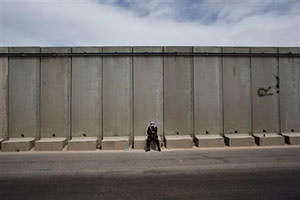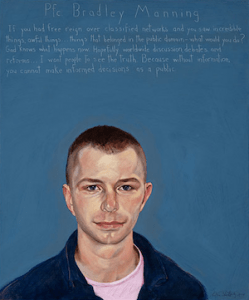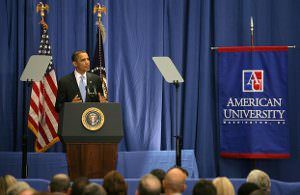How American University Got Involved in Israel’s Public Interest
A 30-year-old program has snowballed and given vigor to the civil rights movement in the Holy Land.
By Thomas Hedges, Center for Study of Responsive Law
Herman Schwartz was shaped by New Deal liberalism. He was born in 1931 and says that it was the emphasis on economic and social justice during that time that contributed to his moral upbringing and, eventually, his life as an attorney. Now 82, he teaches at American University’s Washington College of Law and is an adviser to the fellows enrolled in a program he created almost 30 years ago. The Israel-U.S. Civil Liberties Law Program trains Israeli and Palestinian lawyers in public interest law and then sends them back to Israel to practice what they have learned.
The program has snowballed and given vigor to the civil rights movement in Israel. Israeli newspaper Haaretz described the fellowship as “a quiet revolution” that “has changed the map of human rights in Israel.”
The idea came to Schwartz after a trip he took to Israel in 1983. “I figured I would look up people who were doing civil rights and civil liberties work as I had been doing,” he told me in his office at the Washington, D.C., school. “Turns out there were almost none. So I came back with this rather grandiose idea that we would train Israeli lawyers — Jewish and Palestinian. … The school did something that is simply unheard of,” he continued, “which is to give me, for the program, free tuition for a fellow.” The program has since expanded to take on a second and sometimes a third student.
Whether they are promoting affordable housing, defending Negev Bedouins, litigating on behalf of the disabled, fighting the Citizenship and Entry into Israel Law, which prevents family reunification between Palestinian citizens of Israel and Palestinians from the West Bank and Gaza, the 56 civil liberties program graduates are bringing what they’ve learned in the U.S. back to Israel.
Carmel Pomerantz, 28, and Samar Qudha Tannous, 38, the two fellows for the academic year 2012-13, say that because of the program, Washington has become the capital of public interest law for Israel. Washington-based nongovernmental organizations, they say, are exporting the tradition of civil rights in America to Israel, a country that, despite its own complex history, did not develop the same kind of robust social justice movement that evolved in the U.S.
It might be that Israel is so young, they say, or that the Knesset is not balanced out with state or regional powers that allow for opposition and discussion — a quality that, according to Tannous, allowed for the Little Rock, Ark., school integration crisis to be resolved and that subsequently fueled the 1960s civil rights movement.
Although public interest law continues to grow in Israel, Schwartz, Tannous and Pomerantz acknowledge that there have been some backward steps. The displacement of Palestinians for new settlements, the Nakba Law, which allows the Israeli finance minister to cut funding from organizations that mark the country’s independence day instead as “the catastrophe,” and continuing accusations of torture — progress sometimes ends up in the shadow of new human rights abuses.
“One of the things I’ve always felt is that people who try to make things better will lose most of the time,” Schwartz says, “because it always involves taking on powerful interests and the better, as they see it, is often at their expense.”
“There’s a wonderful line in a Joan Baez song addressed to Bob Dylan” called “To Bobby,” Schwartz says, “when he gave up his social conscience stuff and went into other things telling him to ‘come back.’ And there’s a line in which she sings ‘we’re still marching in the streets with little victories and big defeats.’ “
“If you’re trying to make change,” Schwartz says, “that’s basically the story.”
This article was made possible by the Center for Study of Responsive Law.
Your support matters…Independent journalism is under threat and overshadowed by heavily funded mainstream media.
You can help level the playing field. Become a member.
Your tax-deductible contribution keeps us digging beneath the headlines to give you thought-provoking, investigative reporting and analysis that unearths what's really happening- without compromise.
Give today to support our courageous, independent journalists.







You need to be a supporter to comment.
There are currently no responses to this article.
Be the first to respond.